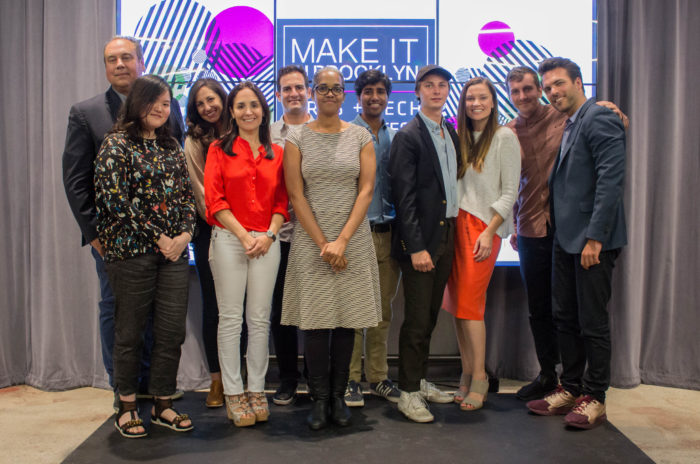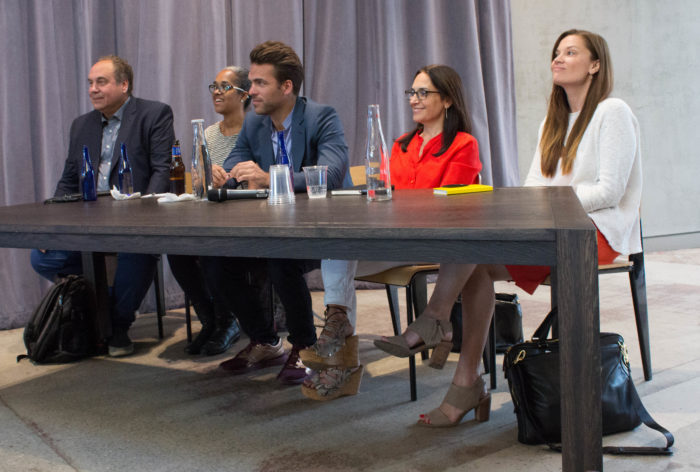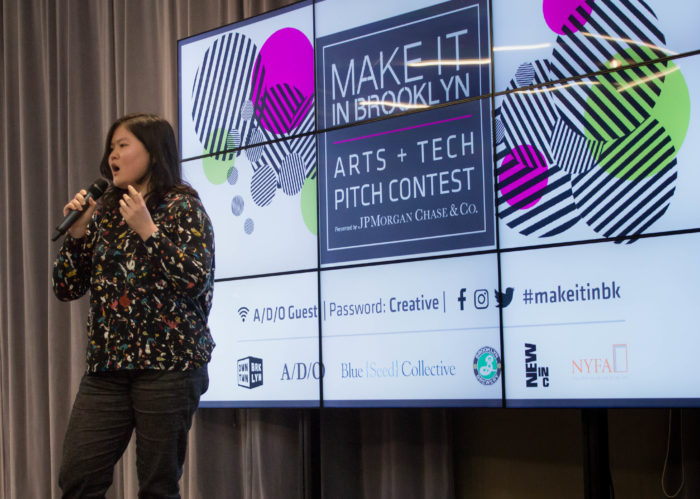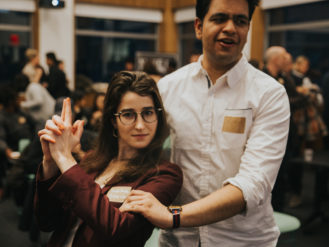When Art and Tech Make a Perfect Marriage
If these five Brooklyn startups get their way, you'll be looking differently at museums, music, TV and books
Founders and judges at this week's Make It in Brooklyn Arts + Tech Pitch Contest (Event photos by Zoi Ellis)
Whatever’s made in Brooklyn doesn’t have to stay in Brooklyn.
In fact, it might actually shake up the art world.
At least that’s the big-picture idea behind the Make It in Brooklyn Arts + Tech Pitch Contest, where five founders from the borough’s most innovative companies got a chance to stand in front of a firing squad (okay, a thoughtful and reasonable group of judges) for the opportunity to nab $5,000 for their start-ups, no strings attached.
The ideas were wide-ranging and the pitches passionate, varying from an augmented-reality music-discovery app (you “drop” songs you enjoy in specific locations and others can pick them up) to a next-level platform for writers inspired by popular Chinese publishers.
Since these products can’t actually be consumed, the event felt less Shark Tank and more Planet of the Apps. Seventy companies applied for the opportunity to pitch at the eighth Make It in BK event; only five were chosen. As Downtown Brooklyn Partnership President Regina Myer said, the purpose of the event is to “celebrate bringing the arts and technology together.” There was no better venue for that than A/D/O, a gorgeous co-working and event space in Greenpoint.
Downtown Brooklyn Partnership hosts the series, underwritten by JPMorgan Chase, while Blue Seed Collective offers up the prize money. The winner was also set to receive free legal counsel from Brooklyn Law School—a nice perk for a new start-up.

The panel of judges hear pitches from the five startups to decide who gets the $5,000 prize
It’s a little challenging to pitch a tech-based idea without visuals, but the founders did an admirable job interpreting their visions for the judge and audience. While the judges seemed to find all of the companies intriguing, they were especially interested in unique and scalable ideas. The judges: De Angela Duff, co-director and an industry associate professor of integrated digital media at NYU Tandon School of Engineering; Jon Vanhala, managing director of Crossfade Partners; Joni Saylor, design principal at IBM; Catherine Levene, co-Founder at Cat Perkins; and J.J. Casper, founder of Blue Seed Collective.
After deliberation in A/D/O’s art-filled courtyard, the judges gave the $5,000 grand prize to … drumroll please … PicFic, saying that it had the potential to be totally new and different from its competition. Read on to find out more about Brooklyn’s talented marriages between the art and tech worlds.
1. Artwrld
Let’s say you’re an artist graduating with an MFA, began the pitch for Artwrld, a digital networking platform. Galleries, unfortunately, won’t be knocking on your door. You have to spend a lot of time building a website and pitching yourself, until soon you’re no longer an artist: you’re a small-business owner. Artwrld wants to be the LinkedIn for artists, a leading database of creativity that also streamlines the artist application process for residencies and fellowships. Whereas Instagram is vast and inefficient at reaching the right audience; Behance caters more to the design world, and Artsy targets sales, Artwrld’s purpose to help define an artist’s career path and debunk the mystery behind fine art, a topic still often intimidating for the general public.
2. Audiodrops
You loved Pokémon Go, right? Now imagine Pokémon Go for music. Audiodrops is a augmented reality location layer hooked to Spotify and soon other social platforms. It’s less of a game and more social exploration. You can discover audio “drops” and leave your own songs in places where they come to mind. Founder Seth Hillinger pointed out that Spotify uploads 20,000 new tracks every day—it’s hard to be heard through the noise. So imagine walking into your coffee shop in the morning and walking out with a new song chosen by the barista. Seeing music in the world around you is an intriguing Black Mirror-esque near future that could change the music industry. Audiodrops is trying to break off a piece of augmented reality’s projected $120 billion industry.
3. Museum Vision
Ever taken a photo at a museum, only to come home and discover its power is lost? Museum Vision is trying to improve the museum-going experience by bringing art alive for people inside and out of exhibitions, billing themselves as “Shazam for art,” according to co-founders Will Denton and Seth Kranzler. You take a picture of a piece of art and are immediately sent back information about the artist and context. Global audiences would especially benefit; according to Museum Vision’s co-founders; 40% of audio guide users at the Metropolitan Museum of Art are non-native English speakers and want more information about the art that they can understand. Most museum apps aren’t intuitive or very helpful; Museum Vision has a working proof of concept for their machine-learning API which it hopes to license to museums. “We think we can change how people interact with art and make it a more engaging and personal experience,” says Denton. They’re off to a good start and will be housed at the New Museum incubator this fall.
4. PicFic

If the publishing industry was an animal, it would be a sloth. Its $42 billion world hasn’t changed much since e-books hit the scene in 2008 and, as PicFic founder Silvia Park (above) says, the majority of writers are failing to find their readers. Her publishing platform PicFic empowers writers by pairing them with illustrators and serializing their work online. The point is to build an audience over time through serialization and an environment that caters to mobile readers, and is inspired by the booming Chinese market, which is way ahead of the game with similar platforms that make reading fun and digital-friendly. “Publishing is going to go digital and we believe we’re going to take it there” she said in her winning pitch.
5. Stareable

“Online creators are fragmented,” says Stareable founder Ajay Kishore. Which was the impetus to bring creators together on a platform that connects fellow collaborators and shares their work in an increasingly digital world. Stareable has 1,800 web-TV series creators onboard and partnerships with Tribeca Film Festival and Seed & Spark. The site has a machine-learning-based recommendation engine to drive growth to web series and their plans for the future are expansions to off-line events in Los Angeles, Atlanta, and more cities around the U.S. For now, they’re incubated at the Made in New York Media Center, but of course viewers can access them anywhere.













